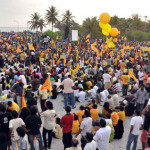The nascent multi-party democracy in Maldives had suffered a setback on 7 February 2012 when the democratically elected president Mohamed Nasheed had to step down under tumultuous circumstances, writes Anand Kumar for India’s Institute for Defence Studies and Analyses.
Though he was succeeded by the then vice president Mohamed Waheed Hassan, the legitimacy of his government was questioned by many. Nasheed and his party the Maldivian Democratic Party (MDP) had termed the change of government as a coup d’état. The continuous political turmoil in the country forced president Waheed to opt for an early election, which is scheduled for September 7. Even then it was felt that political vendetta will not allow all political players to take part in elections. However, finally, now it seems that Maldives is headed for an inclusive election that could restore democracy in the country.
The election process has started with the filing of nomination papers from 15-24 July. Mohamed Nasheed has filed his nomination as the candidate of the largest political party, the MDP. He has chosen veteran administrator and politician Mustafa Lutfi as his running mate. Lutfi was part of the cabinet of both former presidents Gayaoom and Nasheed. He has also been associated with the Maldivian National University and is widely considered as the brain behind a master plan for the development of higher education in Maldives.
Nasheed is likely to face stiff challenge from the Progressive Party of Maldives’ (PPM) candidate Abdulla Yamin who is half brother of former dictator Abdul Gayoom. He has chosen Maldivian Home Minister Mohamed Jameel as his running mate. Gayoom formed PPM when his earlier confidant Ahmed Tasmeen Ali refused to return charge of Dhivehi Rayyithunge Party (DRP) to him. Gayoom had given charge of DRP to Tasmeen Ali, when he left for Malaysia after getting defeated in the first multi-party elections.
The third political front called ‘Forward with the Nation’ coalition is headed by incumbent president Mohamed Waheed who belongs to Gaumee Iththihaadh Party (GIP). He has chosen Tasmeen Ali of DRP as his running mate. This was initially a rainbow coalition and also included religious fundamentalist Adhaalath Party. Adhaalath wants imposition of strict Sharia law in Maldives and also wants ban on men and women dancing in public and ban on alcohol at resorts which are the mainstay of Maldivian economy.
The Adhaalath Party (AP) has, however, quit President Mohamed Waheed’s coalition after Waheed stated in an interview to the AFP that the party had “extremist” individuals. Denouncing the statement Adhaalath said, “The Adhaalath Party does not by any means hold extremist views. The party is working to introduce Islamic principles to the country, to protect the Islamic faith of the country and the country’s sovereign.” Another important desertion has been of Dr Hassan Saeed’s of Dhivehi Qaumee Party (DQP) who was the presidential advisor. He has now joined Jumhoory Party (JP). Waheed has however tried to present a brave face and expressed confidence of ultimately winning the election.
The business tycoon Gasim Ibrahim is the presidential candidate from Jumhoory Party (JP). He had finished fourth in the last presidential election and has picked Dr Hassan Saeed as the running mate. This combination is not supposed to present any serious challenge but has the potential to eat into the votes polled. It is possible that Gasim Ibrahim might tie-up with Abdulla Yamin if the first round fails to throw up a clear winner. In that case the combination would present a formidable challenge and might actually emerge winner.





